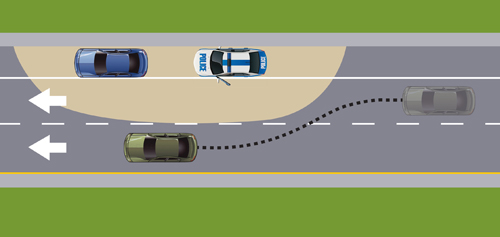New Legislation for October 2015
Serge Semirog
As the fall is clearly upon us, a new wave of legislation enters into effect on October 01, 2015. Let's take a look at the changes to NC General Statutes that affect you directly on the roads:
The first major change pertains to a new type of motor vehicle: the autocycle. But what exactly is an autocycle? Something between a motorcycle and an automobile, House Bill 6 defines it as:
Autocycle. – A three-wheeled motorcycle that has a steering wheel, pedals, seat safety belts for each occupant, antilock brakes, air bag protection, completely enclosed seating that does not require the operator to straddle or sit astride, and is otherwise manufactured to comply with federal safety requirements for motorcycles
The bill goes on to further specify that the autocycle is to be treated much more like a regular car than a motorcycle. You will need a regular driver's license to operate an autocycle (though you can't take the driving test in one) and it must meet much of the same safety regulations as motor vehicles do currently. This bill is more or less a mirror of a recent federal document entitled the Autocycle Safety Act, introduced in the Senate in March.
Next, the Senate introduced Bill 541 which regulates "Transportation Network Companies" and their relationship with the long-established taxi services already provided. This bill likely grew out of the growing concerns of taxi companies upon seeing the rise of businesses like Uber. The bill has two major components: financial responsibility and safety. New regulations govern these transportation network companies making sure that passengers are safe, drivers are capable, and, in the event of an accident, all parties can recover adequately.
Senate Bill 97, a monstrositous four hundred and twenty-nine page document, hides small changes across the board to increase state funding. We will try to enumerate relevant material here:
- Renewal fee for all types of licenses increased from $4.00 to $5.00 a year;
- Motorcycle endorsement fee increased from $1.75 to $2.30;
- Restoration fee after revocation of license increased from $50.00 to $65.00 or, if revoked under 20-17(a)(2), from $100.00 to $130.00;
- Limited Learner's Permit fee increased from $15.00 to $20.00;
- Duplicate license fee increased from $10.00 to $13.00;
- Driver Improvement Clinic fee increased from $50.00 to $65.00;
- Similar increases to fees regarding commercial driver's licenses;
In addition to these smaller changes, Bill 97 introduces a new section 20-88.03 that imposes a late registration fee. The above-mentioned fees and others related to motor vehicles are to be adjusted again in 2020 and every four years afterwards.
Senate Bill 90, a much smaller document, clarifies that motor vehicles must have two stop lamps (previously "brake lights"), one on each side. Presumably, some cheeky person found a loophole and, taking advantage of the ambiguity, produced a car with stop lamps on one side of the car, clearly with reduced safety.
House Bill 102 enlarges the "Move-Over Law," which requires that drivers move over for stopped emergency and law enforcement vehicles. It now includes vehicles used "in the collection of refuse, solid waste, or recycling." Not moving over is considered negligence per se.
House Bill 229, while making several statutes gender neutral, allows people with a limited driving privilege to drive to his or her place of religious worship.
The bills we mention today pertain to your experiences on the roadways, but Senators and Legislators in general have been busy codifying practice and amending previous statutes across the board. Be sure to check back here for the most current automobile related legislation updates.


